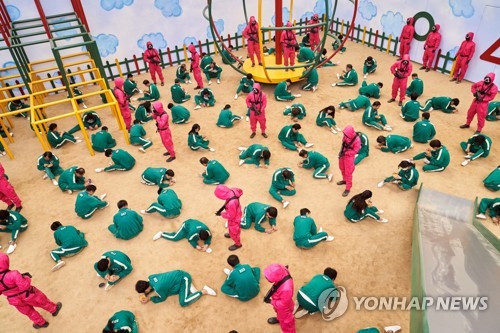
"Debt, inequality, death - the 'squid game' economy."
This is the title of a column related to Korea published on the 12th by Justin Himines, an economist at Bloomberg Intelligence, a research institute affiliated with Bloomberg.
Himineth The Economist unraveled the keywords of Korean society, which he read through the Netflix drama 'Squid Game', which was recently a global topic, and the movie 'Parasite', which swept the American Academy Awards last year, with specific figures.
He diagnosed that Korea has achieved rapid economic recovery despite the novel coronavirus infection (COVID-19) crisis, but has serious socio-economic problems, such as high debt ratio and soaring house prices, as shown by the squid game and Parasite.
The fierce survival game played by Koreans driven by debt to win 45.6 billion won in prize money reveals this reality.
A lot of debt is not a matter of a day or two. House prices are about twice that of disposable income, and debt growth outpaces nominal gross domestic product (GDP) growth. Wage income is not growing, but the cost of living is rising, he said, and people are being pushed to loans.
In addition, as interest rates have fallen to the lowest level, young people are taking on debt and investing in assets such as stocks and virtual currencies. According to the author, the perception of young Koreans is that the only way to achieve economic success is speculation.
Rising household debt is also fueling the overheating of the asset market. Although the Moon Jae-in administration has already taken numerous measures to stabilize house prices, the average apartment price has soared by more than 70% compared to the past five years, economist Jimines explained.
Given the limited wage growth rate, owning a house has become a more distant dream. As of June, the median apartment sale price exceeded 1.4 billion won in 11 districts in the Gangnam area. The Gangbuk area, including Ssangmun-dong, where the main character Seong Ki-hoon (Lee Jung-jae) resides, is also worth 959 million won.
The movie Parasite has already shed light on the problem of the gap between the rich and the poor in Korean society.
The income gap in Korean society is higher than that of OECD member countries. According to the Bank of Korea, the nation's Gini coefficient rose as the income of the fifth income quintile (lower 20%) decreased due to the COVID-19 outbreak in Korea. The Gini coefficient (0~1) means that the higher the value, the greater the income inequality.
In the past, overall income inequality in the labor market has continued. In particular, the average wage of non-regular workers is less than half that of regular workers.
The issue of conglomerates cannot be overlooked. The economist Jimenez pointed out that the chaebol, which is having an impact on Korean society as a whole, is a major factor in the dual structure of the labor market.
Citing the Fair Trade Commission, he said that the sales of the top five groups last year amounted to 852 trillion won, or 44% of their nominal GDP.
He pointed out that this reality stifles competition and discourages wage increases. He also pointed out that their huge cash holdings are a factor hindering investment.
He added that although voices for reform arose early after the foreign exchange crisis, the change was slow.
In the gloomy reality, young people choose risky options like virtual currency, or sometimes make extreme choices, such as ending their lives.
The suicide rate, which is the highest among OECD countries, and the youth unemployment rate, which is more than double the overall unemployment rate, are indicators of this.
The elderly also suffer from a lack of social safety nets such as public pensions and family support. About 43% of people over the age of 65 earn less than half of the median household income, I explained.
This reality is the reason why participants in the squid game call the outside world 'hell', economist Jimenez analyzed. Hell is also a term used by real-life young people to refer to the grim reality of Korea.
However, he mentioned the entertainment industry as a positive point of Korean society. The contribution of entertainment industries such as squid games and parasites as well as K-pop to national income is growing. It has been estimated that Netflix invested in Korean content and produced an economic effect of 5.6 trillion won over five years.
However, I emphasized that a more even distribution of profits must follow to solve the problems of the squid game economy.
후원하기
- 정기후원
- 일반 후원
- ARS 후원하기 1877-0583
- 무통장입금: 국민은행 917701-01-120396 (주)메이벅스
- 후원금은 CNN, 뉴욕타임즈, AP통신보다 공정하고
영향력있는 미디어가 되는데 소중히 쓰겠습니다.
Fn투데이는 여러분의 후원금을 귀하게 쓰겠습니다.


